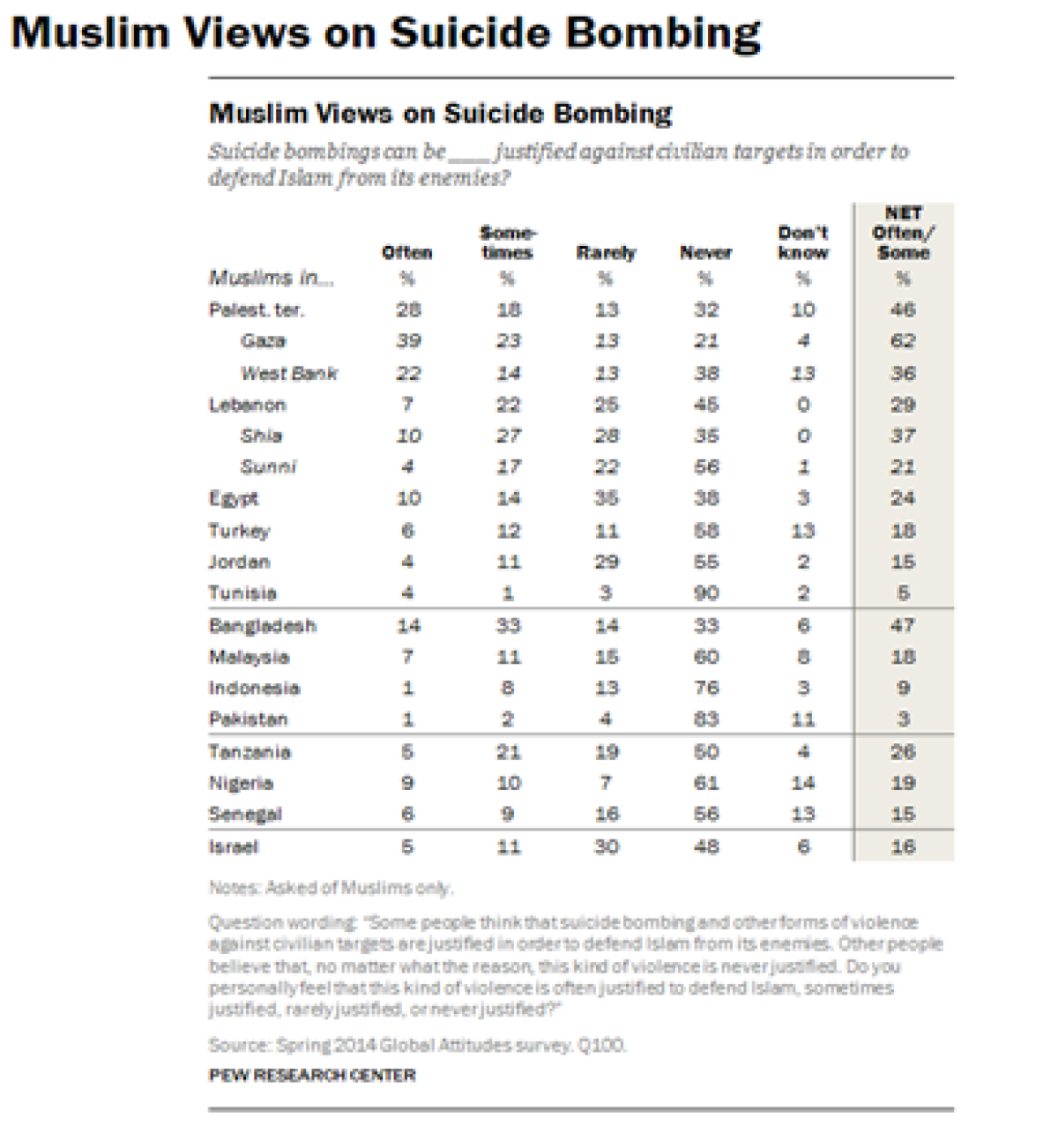
This article first appeared on the American Enterprise Institute site.
In his speech at the Israel Museum this week, President Trump declared:
I am personally committed to helping Israelis and Palestinians achieve a peace agreement, and I had a meeting this morning with President Abbas and can tell you that the Palestinians are ready to reach for peace. I know you've heard it before. I am telling you — that's what I do. They are ready to reach for peace.
It's not surprising that Trump wants to try. An Israeli-Palestinian peace agreement is the Holy Grail (pun intended) of American diplomacy.
But what Trump does not seem to realize is that the reason every president before him has failed to achieve it is not for a lack of presidential negotiating skill. It is because, for Israel to make peace, it needs a partner who actually wants peace.
And – contrary to Trump's comments above – Palestinians do not really want peace.
Indeed, polling data show that Palestinians are the most radicalized, anti-peace population in the entire Muslim world.
According to a 2014 Pew Research Center poll, support for suicide bombings has declined significantly across the Muslim world in recent years – everywhere except the Palestinian territories.
RELATED: Elliott Abrams : Why Are Palestinian Kids Being Taught to Hate?
For example, in Pakistan just 3 percent of the Muslim population now says that suicide bombings are "often" or "sometimes justified." In the Palestinian territories it is 46 percent – nearly half – which is the highest among 21 countries polled.
In Gaza, territory controlled by Hamas, support for suicide bombings is even higher, at 62 percent.

Or take the recent spate of knife attacks by Palestinian terrorists targeting Israeli civilians and police. A March 2016 poll by the Palestinian Center for Policy and Survey (PSR) found that a 58 percent majority of Palestinians support knife attacks (which the poll notes had dropped from 67 percent in a poll three months earlier). In Gaza, support knife attacks was 82 percent (down from 85 percent three months earlier).
The poll also notes that "a majority in both the West Bank and the Gaza Strip continues to support an armed intifada and continues to believe that such an intifada would help Palestinians achieve national rights in ways that negotiations could not." In the West Bank, 60 percent hold this view while in Gaza it is held by 75 percent of the population.
The poll also found that "a slim majority of 51 percent supports and 48 percent oppose the two-state solution. Three months ago, 45 percent supported and 54 percent opposed this solution." So essentially only half of the Palestinian population is ready to live side-by-side in peace with Israel.
The December 2015 PSR poll (the one taken three months earlier) had another interesting finding: "only 39 percent [of Palestinians] support a mutual recognition of national identity of Israel as the state for the Jewish people and Palestine as the state for the Palestinian people and 61 percent oppose it."
How is Israel supposed to make peace with people who support suicide bombings and knife attacks against innocent people and do not recognize the right of Israel to exist as a Jewish state?
The answer: They can't.
RELATED: Elliott Abrams : Trump's Israeli Settlements Policy Is the Way to Go
The fact is Palestinians still refuse to recognize the right of Israel to exist as a Jewish homeland, a Jewish state, in any boundary. They support terror and violence over negotiations and compromise. That is the true core of the conflict.
It's not about settlements. Israel withdrew all 21 settlements in Gaza. In fact, Israel withdrew from Gaza entirely. And today Gaza is the most radical part of Palestinian territories. More than 8 in 10 Gazans support knife attacks on innocent Israelis.
Why is this? Because Palestinian leaders fill their people with hatred for Israel every single day. They name youth soccer teams after terrorists who blew up innocent Israeli citizens and erect statues to them. They produce children's shows that show Jews as subhuman. As Prime Minister Netanyahu pointed out during Trump's visit, they pay the families of suicide bombers who kill Israelis.
President Abbas – the so-called "moderate" – has said, "We welcome every drop of blood spilled in Jerusalem." One of his advisors urged Palestinians to "slit the throats of Israelis wherever you find them."
Little wonder that there is such radicalism and support for terror among Palestinians. And the problem is not going to get better anytime soon. Here is the most depressing finding of the PSR poll:
As we found in our previous two polls, in September and December 2015, the "Oslo generation" of youth between the ages of 18 and 22 are the least supportive of the two-state solution, the most supportive of stabbing attacks, and the most likely to think that an armed intifada would help Palestinians achieve national rights in ways that negotiations could not.
In other words, the generation of Palestinians coming up today is even more radical than those who came before them. So while it would be nice if the Palestinians were in fact "ready to reach for peace," the data suggest that is not so.
Marc Thiessen is a resident fellow at the American Enterprise Institute (AEI) where he studies and writes about American presidential leadership and counterterrorism. A member of the White House senior staff under President George W. Bush, Thiessen served as chief speechwriter to the president and to Secretary of Defense Donald Rumsfeld. Before joining the Bush administration, Thiessen was spokesman and senior policy adviser to Senate Foreign Relations Committee Chairman Jesse Helms (R-NC).
Uncommon Knowledge
Newsweek is committed to challenging conventional wisdom and finding connections in the search for common ground.
Newsweek is committed to challenging conventional wisdom and finding connections in the search for common ground.
About the writer
To read how Newsweek uses AI as a newsroom tool, Click here.








